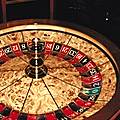- By Dan Veaner
- News
 Print
Print  Is bingo illegal in Lansing? Cake wheels? Raffles? Lansing Town Council members were surprised Wednesday to learn that the Town's bingo and games of chance law is so out of date that it is no longer in compliance with New York State law. That may mean that all charitable games of chance are illegal in Lansing until the Town Board updates the town's local gaming laws.
Is bingo illegal in Lansing? Cake wheels? Raffles? Lansing Town Council members were surprised Wednesday to learn that the Town's bingo and games of chance law is so out of date that it is no longer in compliance with New York State law. That may mean that all charitable games of chance are illegal in Lansing until the Town Board updates the town's local gaming laws."We have to have a local law authorizing those activities within the Town of Lansing," said Lansing Town Attorney Guy Krogh. "And we have to do some policing on behalf of the State."
The laws apply to local charitable organizations such as local churches, the Lansing Lion's Club and Lansing Ithaca Rotary, The Lansing Community Council, Lansing Older Adults Program, and school raffles. Krogh says there are hundreds of pages of regulations. The New York State Wagering Board regulates charitable gaming including Bingo and Bell Jar games, raffles, casino games and Las Vegas Nights. Texas Hold'Em is specifically barred as a charitable game of chance.
Krogh said that laws governing charities were tightened up in the aftermath of the 9/11 attack on the World Trade Center in New York City after it was learned that some funds were being diverted from American charitable organizations to terrorist organizations. He also noted that the laws don't always make sense, but whether or not they do is irrelevant because it is state law.
"There is a distinction between a game of chance and a game of skill," Krogh said. "In New York State if it's a game of skill it's not technically as regulated," he said. "But it's not clear: for example they consider Texas Hold'em a game of chance. If you actually play poker you know that's a game of skill."
Krogh says the existing town ordinance that was put in place on April 12, 1958 is clearly not legal. He says it was amended in 1963 to allow a $250 maximum single prize with a cap on aggregated prizes at $1,000.
"You can see these numbers are way out of line," Krogh said. "Obviously this ordinance, like many of the others we have on the books, just doesn't make any sense."
Krogh says there are three bodies of law that regulate charitable gambling including two chapters of the general municipal law, and one chapter of the executive law. Charitable organizations must file forms with the state Racing & Wagering Board before holding charitable games of chance. There must be a local law in place that defines allowed gaming before authorization can be given by the State.
"There are two different types of forms," Krogh explained. "There is the quick sort of form where it's a small thing for a local charity, a couple hundred bucks, not a big deal. But if you are raffling off a car or something like that you have to go through a more complicated form."
The council had several questions about existing raffles and games in the Town of Lansing and how the laws apply. Council members were clearly surprised at the range of games that are subject to regulation. What seemed like simple, small-amount local fund-raisers turn out to be subject to regulation. Councilwoman Andra Benson mentioned a priest at All Saints Church is also a chef. The church raffles a meal cooked by him as a fund raiser. She asked whether that was subject to regulation. Supervisor Kathy Miller was clearly surprised that it is.
"So let's say you're paying $20 for something that's really worth $200 and some profit is generated for the underlying organization to fund something," Krogh surmised. "My guess is that would be regulated. It's a game of chance."
The outcome is that the Town Board will have to create a new law to set limits on gaming in the town. He said that current bingo games in the town are probably legal even though the ordinance is not in compliance with the penal law and the executive law. He added that he can't find any evidence that the Town has any law on the books that authorizes games of chance.
"The problem is that this ordinance does not comply with existing law," Krogh said. "The numbers are way out of line."
Krogh said that the new law will set new caps on prizes according to what the Town Board wants, but he recommends that caps be set according to whatever the state law allows. He said that the law is subject to a mandatory public referendum before it may be adopted.
v8i26


